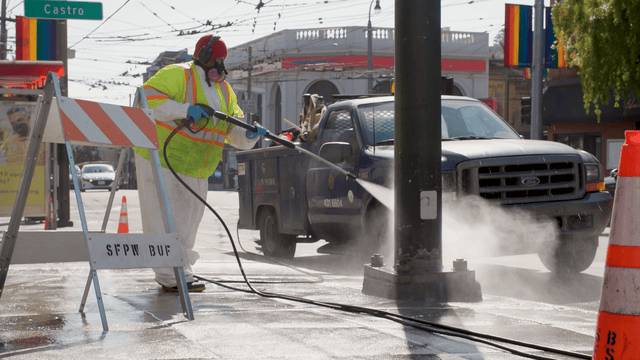San Francisco is a city famous for its beautiful Victorian mansions and scenic views. At the same time, the city is infamous for its dirty streets.
In some parts of the city, the public perception of SF’s grimy streets is based in reality: Feces-on-the-streets complaints skyrocketed in the last decade, requests for street and sidewalk cleaning reached a record high in 2022 and it often takes longer than 48 hours for city departments to respond to these requests.
As more San Franciscans start calling on the city to clean its streets, many might be unaware of how much of the cleaning duties are the responsibility of the city, or the legal hurdles the city faces during seemingly routine processes like sidewalk sweeping or poo clearing.
“A lot of people say, ‘I pay my taxes—isn’t it the city’s responsibility?’” said Vince Yuen, founder of cleanup group Refuse Refuse San Francisco. “Yes, in an ideal, very efficient way, your monetary resources can pay for resources that keep every single square inch of the city clean.
“But once you come pick up trash on your own, you’ll see the scale of the problem is much bigger,” Yuen continued.
The biggest misconception? That San Francisco is responsible for all messes you see on city sidewalks. Though the city has a wide variety of cleaning services it deploys daily—ranging from the infamous poo patrol to scheduled power washing in particularly dirty neighborhoods—it’s not actually allowed to clean up every street corner or sidewalk by law.
State law requires store owners and ground-floor homeowners to maintain the sidewalks around their property, which includes cleaning up trash and litter on sidewalks that are considered to be privately owned.
City data shows some agencies may decline cleaning services if trash is found on private property. And city administrators say a recent court injunction that prohibits sweeping encampments has contributed to SF’s dirty optics problem.
City representatives argue there needs to be a better culture of communal responsibility and cleaning in San Francisco. While others argue that policy-level cleaning reforms are still desperately needed, local advocates say reforms should be matched by increasing public volunteerism.
“We know we cannot take care of everything on our own, and it’d be really nice if we could,” said Department of Public Works spokesperson Rachel Gordon. “When people pitch in and take some ownership of the city, I think everyone benefits by that. They see that it’s not just going to be maid service in San Francisco.”
If you’re worried about filthy streets, here’s what you can do, besides yelling at your local lawmaker.
1. Call 311.
The best way to get the city’s attention about an overflowing trash can or poo-lined street is to contact the 311 help line and make a street or sidewalk cleaning request. City agencies are not guaranteed to respond to or resolve every single inquiry, but contacting this service is a good way to flag problems to officials.
2. Talk to the Public Works Outreach and Enforcement Team.
There are a lot of complicated rules about street and sidewalk cleaning. During the CleanCorridorsSF deep cleanings that the city gives different neighborhoods throughout the year, property owners can talk to on-site members of the outreach and enforcement (OnE) team about their particular cleaning responsibilities. A schedule of future cleanings planned weekly on Thursdays can be found here.
3. Contact Public Works About Its Opt-In Graffiti Abatement Program
Got graffiti problems? Residents and business owners in some SF neighborhoods can sign up for the Public Works abatement program, which provides graffiti removal services. Though it’s only a pilot program, interested property owners can participate until the end of 2024.
4. Apply to Become a Community Ambassador for San Francisco.
Community Ambassadors do many things for the city, including reporting about cleanliness, graffiti and hazardous waste. It’s a part- or full-time job for underemployed and unemployed folks, and the position can involve regular street sweeping.
5. Use Pit Stops to Your Advantage.
Did you know the city has more than 30 “Pit Stops,” or public toilets, scattered throughout the city? Most are located in the Tenderloin and Mission neighborhoods, and each Pit Stop is equipped with needle drop boxes and free dog waste bags.
6. Adopt a Street or Sewer—Literally.
Ever seen a smelly street or a clogged sewer drain and wanted to do something about it? The city allows residents to “adopt” a street or sewer of their choice, making sure it remains clear, unclogged and spotless. The city will provide participants with rakes, trash bags, dustbins and other cleaning supplies.
Pro tip: Yuen says you’re not bound to clean just one street. You can adopt a street in order to collect cleaning supplies from the Department of Public Works, and then set out to sweep at any neighborhood or street that needs it.
7. Participate in Volunteer Cleaning Programs.
Numerous city agencies and local organizations host volunteer cleanups and street sweeping services: Public Works hosts monthly Neighborhood Beautification Days, where residents help with landscaping, gardening, sidewalk cleaning and graffiti removal. Refuse Refuse SF also hosts near-weekly cleanups, including a recent quirky singles-only event.
8. For the Love of All Things San Francisco, Stop Littering.
Did you know that you could be charged $320 for leaving your dog’s poo pile on the streets? Littering will cost you another $135, if you’re caught, and the city once paid $10.7 million per year to remove cigarette butts from sidewalks.
If you’ve got a coffee cup on hand, wait until you see the next public trash can to throw it away. If you have a broken bed frame and need it hauled away, call Recology instead of leaving it on the street.
Just don’t do it, OK?
